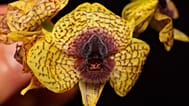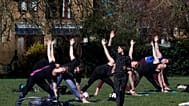Leila Khaled is the first woman to hijack an airplane.
Leila Khaled is the first woman to hijack an airplane. For the Palestinians she is a symbol of resistance. She was born in Haifa, Israel, but the age of four was forced to leave during the Nakba (1948 Palestinian exodus).
Khaled hijacked her first plane in 1969, TWA Flight 840 from Rome to Tel Aviv. One year later she attempted to do the same on El Al Flight 219 from Amsterdam to New York.
The attempt was foiled and she was arrested as the plane landed in Britain but later freed in exchange for the release of hostages.
She is a prominent member of the Popular Front for the Liberation of Palestine (PFLP) – classed as a terrorist organisation by the EU and the US – and a member of the Palestinian National Council. She lives in Jordan with her family.
She came to Athens to attend Resistance Festival 2016, organized for the ninth consecutive year by the weekly newspaper Dromos Path of the Left and spoke to euronews’ Michail Arampatzoglou.
She talks about the place of armed struggle in the Palestinian Israeli conflict, the role of negotiations and reflects about her own status.
euronews: You were 25 when you carried out your first hijacking. If you had a young Palestinian activist before you what you would tell him today?
Leila Khaled: I would tell him “go ahead, struggle to go back to your homeland by all means because this is our right to be in our homeland, where we were forced to leave and some other people came and took our houses and took our properties, our homeland.” So I would tell anyone, an activist to go forward to restore this homeland with us.
euronews: What are the difficulties involved, when it comes to being a woman taking up arms?
Leila Khaled: It’s not difficult as long as a human being feels the injustice and oppression and when one is aware of the dangers of oppression, and to be human also. When you defend humanity, you use all the means at your disposal. Some use words, some use arms and some use politics. Some use negotiations. I chose arms and I believe that taking up arms is one of the main tools to solve this ( Palestinian-Israeli) conflict in the interest of the oppressed and not the oppressors. A word can be also arms in the struggle. So I believe that women defend life because they are the ones who bring life.
euronews: Τhere are many people out there who believe that you are a terrorist. Are you?
Leila Khaled: Ι am afraid I am a freedom fighter, whatever that means or whatever the media that is controlled by Zionism and the imperialists say. They can give us or label us whatever they want. I say occupation is terrorism. Zionism is terrorism. Imperialists are terrorists. They are the ones who create wars against the people of the world. I don’t know what they label us but I know myself as a part of my people’s struggle as a freedom fighter.
euronews: When addressing the European Parliament, (former Palestinian President Mahmoud) Abbas asked for help to end Israel’s occupation of the Palestinian territories and support for a viable peace agreement. Do you think that there are any sustainable prospects concerning a solution to the Palestinian-Israeli conflict?
Leila Khaled: This is a historical conflict. It cannot be solved by negotiations and the leadership tried to negotiate since 1991. Τhe leadership of the PLO went to Oslo and had an agreement which did not deal with the core issues of the Palestinians. The core issues are twofold: the land to be sovereign, and who will be sovereign in that land and the refugees to return to their homeland, according to a UN resolution. Israel has confiscated more land from the Palestinians, building a wall, having more settlers in our land, putting people in prisons and assassinating activists, deporting our people, so after Oslo accords we have lost a lot. What is the solution?
euronews: What are the possible initiatives that the EU could take to help solve this conflict?
Leila Khaled: The first thing is to support people struggling for their liberation. First to support the Palestinians. The second is to cut ties with the occupiers. Because this is the only way to press Israel, which considers itself above international law. Because to support occupiers means you support their policy and their policy is fascist, it is a new version of Nazism.
euronews: You have claimed that ISIS is nothing more than a fabricated organisation supported and instigated by imperialists. In your opinion is there not any connection at all between ISIS and religious fundamentalism?
Leila Khaled: ISIS uses religion as a tool to influence the people. Because in our region Islam is the culture since 1,400 years and it’s very easy to influence the people. especially after those defeats from the Arab countries. The Arab regimes had no democracy and for this reason we saw, in 2010 and 2011, people stormed the streets like in Egypt and Tunisia and in other countries like Bahrain and called for democracy. The presidents fell but the system is still there. For this reason ISIS uses religion to motivate people that you have to defend themselves by religion, which I don’t think is the motivation.
euronews: What are the possible ways to address the radicalisation of young Muslims throughout Europe?
Leila Khaled: When people go to other countries fleeing the atrocities of occupation or oppression, they should be integrated in the society and play a role to be a part of the progressive people and the progressive forces that are calling for justice, for sustainable development and so on and not to go to change the regimes in Europe. It’s not their country, their homeland. And it’s a place where refugees go to flee all the oppression in their countries. So from a human point of view I see that who gives you refuge and gives a place and a position to be safe, one should be thankful and should work as the people of that country who gave that refuge.















![[Interview] Meet Leila Khaled, the first woman to hijack a plane](https://static.euronews.com/articles/337169/1536x864_337169.jpg)